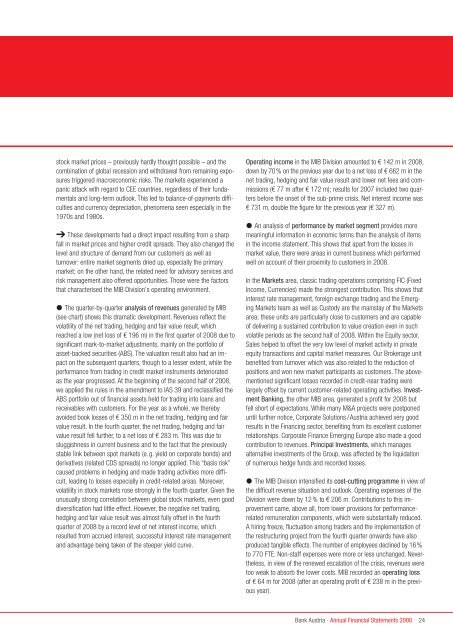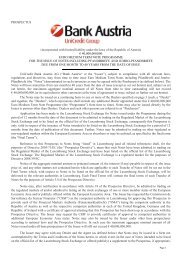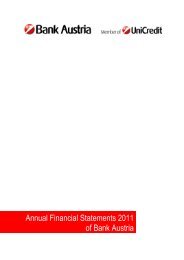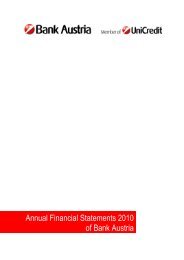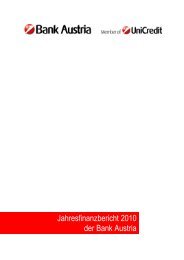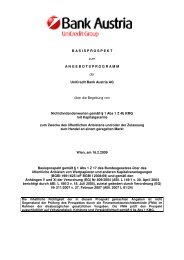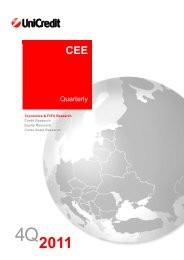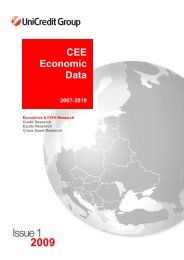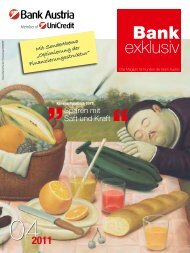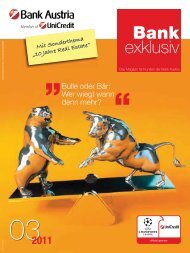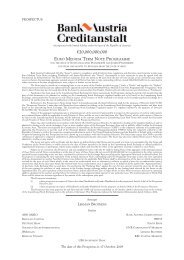Annual Financial Statements 2008 of Bank Austria
Annual Financial Statements 2008 of Bank Austria
Annual Financial Statements 2008 of Bank Austria
Create successful ePaper yourself
Turn your PDF publications into a flip-book with our unique Google optimized e-Paper software.
stock market prices – previously hardly thought possible – and the<br />
combination <strong>of</strong> global recession and withdrawal from remaining exposures<br />
triggered macroeconomic risks. The markets experienced a<br />
panic attack with regard to CEE countries, regardless <strong>of</strong> their fundamentals<br />
and long-term outlook. This led to balance-<strong>of</strong>-payments difficulties<br />
and currency depreciation, phenomena seen especially in the<br />
1970s and 1980s.<br />
➔ These developments had a direct impact resulting from a sharp<br />
fall in market prices and higher credit spreads. They also changed the<br />
level and structure <strong>of</strong> demand from our customers as well as<br />
turnover: entire market segments dried up, especially the primary<br />
market; on the other hand, the related need for advisory services and<br />
risk management also <strong>of</strong>fered opportunities. Those were the factors<br />
that characterised the MIB Division’s operating environment.<br />
� The quarter-by-quarter analysis <strong>of</strong> revenues generated by MIB<br />
(see chart) shows this dramatic development. Revenues reflect the<br />
volatility <strong>of</strong> the net trading, hedging and fair value result, which<br />
reached a low (net loss <strong>of</strong> € 196 m) in the first quarter <strong>of</strong> <strong>2008</strong> due to<br />
significant mark-to-market adjustments, mainly on the portfolio <strong>of</strong><br />
asset-backed securities (ABS). The valuation result also had an impact<br />
on the subsequent quarters, though to a lesser extent, while the<br />
performance from trading in credit market instruments deteriorated<br />
as the year progressed. At the beginning <strong>of</strong> the second half <strong>of</strong> <strong>2008</strong>,<br />
we applied the rules in the amendment to IAS 39 and reclassified the<br />
ABS portfolio out <strong>of</strong> financial assets held for trading into loans and<br />
receivables with customers. For the year as a whole, we thereby<br />
avoided book losses <strong>of</strong> € 350 m in the net trading, hedging and fair<br />
value result. In the fourth quarter, the net trading, hedging and fair<br />
value result fell further, to a net loss <strong>of</strong> € 283 m. This was due to<br />
sluggishness in current business and to the fact that the previously<br />
stable link between spot markets (e.g. yield on corporate bonds) and<br />
derivatives (related CDS spreads) no longer applied. This “basis risk”<br />
caused problems in hedging and made trading activities more difficult,<br />
leading to losses especially in credit-related areas. Moreover,<br />
volatility in stock markets rose strongly in the fourth quarter. Given the<br />
unusually strong correlation between global stock markets, even good<br />
diversification had little effect. However, the negative net trading,<br />
hedging and fair value result was almost fully <strong>of</strong>fset in the fourth<br />
quarter <strong>of</strong> <strong>2008</strong> by a record level <strong>of</strong> net interest income, which<br />
resulted from accrued interest, successful interest rate management<br />
and advantage being taken <strong>of</strong> the steeper yield curve.<br />
Operating income in the MIB Division amounted to € 142 m in <strong>2008</strong>,<br />
down by 70 % on the previous year due to a net loss <strong>of</strong> € 662 m in the<br />
net trading, hedging and fair value result and lower net fees and commissions<br />
(€ 77 m after € 172 m); results for 2007 included two quarters<br />
before the onset <strong>of</strong> the sub-prime crisis. Net interest income was<br />
€ 731 m, double the figure for the previous year (€ 327 m).<br />
� An analysis <strong>of</strong> performance by market segment provides more<br />
meaningful information in economic terms than the analysis <strong>of</strong> items<br />
in the income statement. This shows that apart from the losses in<br />
market value, there were areas in current business which performed<br />
well on account <strong>of</strong> their proximity to customers in <strong>2008</strong>.<br />
In the Markets area, classic trading operations comprising FIC (Fixed<br />
Income, Currencies) made the strongest contribution. This shows that<br />
interest rate management, foreign exchange trading and the Emerging<br />
Markets team as well as Custody are the mainstay <strong>of</strong> the Markets<br />
area; these units are particularly close to customers and are capable<br />
<strong>of</strong> delivering a sustained contribution to value creation even in such<br />
volatile periods as the second half <strong>of</strong> <strong>2008</strong>. Within the Equity sector,<br />
Sales helped to <strong>of</strong>fset the very low level <strong>of</strong> market activity in private<br />
equity transactions and capital market measures. Our Brokerage unit<br />
benefited from turnover which was also related to the reduction <strong>of</strong><br />
positions and won new market participants as customers. The abovementioned<br />
significant losses recorded in credit-near trading were<br />
largely <strong>of</strong>fset by current customer-related operating activities. Investment<br />
<strong>Bank</strong>ing, the other MIB area, generated a pr<strong>of</strong>it for <strong>2008</strong> but<br />
fell short <strong>of</strong> expectations. While many M&A projects were postponed<br />
until further notice, Corporate Solutions / <strong>Austria</strong> achieved very good<br />
results in the Financing sector, benefiting from its excellent customer<br />
relationships. Corporate Finance Emerging Europe also made a good<br />
contribution to revenues. Principal Investments, which manages<br />
alternative investments <strong>of</strong> the Group, was affected by the liquidation<br />
<strong>of</strong> numerous hedge funds and recorded losses.<br />
� The MIB Division intensified its cost-cutting programme in view <strong>of</strong><br />
the difficult revenue situation and outlook. Operating expenses <strong>of</strong> the<br />
Division were down by 12 % to € 206 m. Contributions to this improvement<br />
came, above all, from lower provisions for performancerelated<br />
remuneration components, which were substantially reduced.<br />
A hiring freeze, fluctuation among traders and the implementation <strong>of</strong><br />
the restructuring project from the fourth quarter onwards have also<br />
produced tangible effects. The number <strong>of</strong> employees declined by 16 %<br />
to 770 FTE. Non-staff expenses were more or less unchanged. Nevertheless,<br />
in view <strong>of</strong> the renewed escalation <strong>of</strong> the crisis, revenues were<br />
too weak to absorb the lower costs. MIB recorded an operating loss<br />
<strong>of</strong> € 64 m for <strong>2008</strong> (after an operating pr<strong>of</strong>it <strong>of</strong> € 238 m in the previous<br />
year).<br />
<strong>Bank</strong> <strong>Austria</strong> · <strong>Annual</strong> <strong>Financial</strong> <strong>Statements</strong> <strong>2008</strong><br />
24


